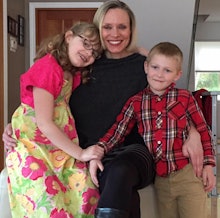This Mom Wrote A Powerful Letter About Parenting And Mental Health

Get the five stories that will challenge you to rethink the world by signing up for MicCheck Daily.
Last month, 41-year-old blogger Sara Lindberg crushed social stigmas surrounding parenting and mental health when she wrote a viral letter about anxiety, addressed to her 8-year-old daughter and 6-year-old son.
"Anxiety has been a part of my life for as long as I can remember," Lindberg wrote. "It's been my constant companion through adulthood; it was even with me when I was your age."
The letter sparked an outpouring of personal stories from parents across the country struggling with the same issues. Since May is Mental Health Month, Lindberg replied to the initial response to her viral letter with another personal post about parenting and anxiety.
"Mental health is not something to be ashamed of and the more we own our stories, the better chance we have at living a life filled with happiness," she wrote on Facebook.
In a phone interview, Lindberg said her posts have clearly struck a chord with parents and teens alike. A school counselor in Bremerton, Washington, Lindberg said that several students have come forward after reading her blog posts to seek help with their anxiety and panic attacks for the first time. Parents have also come forward to ask her for advice on how to talk to kids about their own anxiety and depression.
"You educate [kids] in tiny chunks," Lindberg said. "If you don't talk to [kids], they're going to worry about you... it's not their job to worry about their parents."
Statistically speaking, young women are more likely to struggle with anxiety than their male classmates, and that gendered experience of mental health continues into adulthood. According to the Anxiety and Depression Association of America, women are twice more likely to have an anxiety disorder than men. The National Alliance on Mental Health estimates there are 40 million American adults that have an anxiety disorder, yet as Lindberg points out, "there's still a social stigma. A lot of women feel isolated and don't talk to each other about it."
Lindberg believes there should be more resources for parents who want to talk about mental health with their kids. Yet she cautions that parents should walk a fine line to establish healthy communication patterns.
"I think parents who overshare [about mental health issues] can be really detrimental," Lindberg warned. "But I want to be the one who explains to them why I might act in a certain way ... I tell my daughter if you talk about it, it doesn't have control over you."
Lindberg also emphasized how important it is for parents to find fellow adults they feel comfortable and safe talking to about mental health.
"So many kids sit in my office and say they're too scared to tell anyone," Lindberg said. "It's important for kids to see we struggle and there are ways to deal with our struggle ... to see solutions."
h/t Self